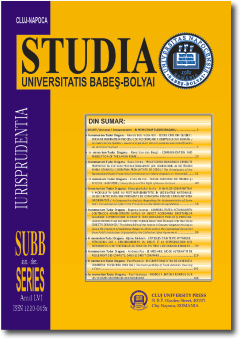ISTORICUL UNUI CONCEPT: PUTATIVITATEA CĂSĂTORIEI ÎN GÂNDIREA JURIDICĂ MEDIEVALĂ ȘI CONTEMPORANĂ
HISTORY OF A CONCEPT: PUTATIVE MARRIAGE IN MEDIEVAL AND CONTEMPORARY LEGAL THINKING
Author(s): Marius-Ioan FloareSubject(s): Law, Constitution, Jurisprudence
Published by: Studia Universitatis Babes-Bolyai
Keywords: marriage; nullity; putative; canon law; benefit; legal history.
Summary/Abstract: History of a Concept: Putative Marriage in Medieval and Contemporary Legal Thinking. Putative marriage is a concept that first appeared in Roman Law and was further refined during the High Middle Ages and the classical age of Canon Law. While the medieval legal thinkers were mostly preoccupied with the avoidance of sin and the consequences of an invalid marriage upon the legitimacy of the resulting children, contemporary legal thinking is the beneficiary of a structural redefinition of the concept that had started in the Late Middle Ages, giving it more pragmatic and material consequences. Because filiation is no longer negatively affected by the validity of the parents’ marriage, putative marriages today only have consequences affecting the wealth of the spouses.
Journal: Studia Universitatis Babes Bolyai - Iurisprudentia
- Issue Year: 61/2016
- Issue No: 4
- Page Range: 42-47
- Page Count: 6
- Language: Romanian

